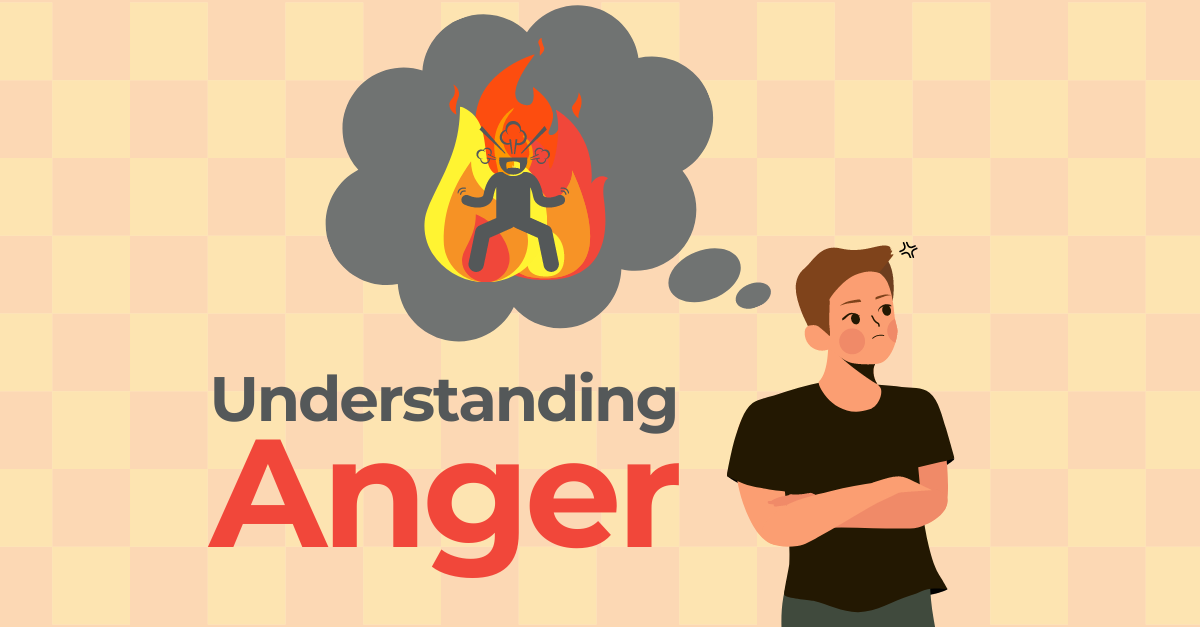Anger is a natural human response. Like all emotions, anger provides the information we can use to navigate life. And as with other emotions, anger isn’t good or bad. However, it can have a positive or negative impact on our relationships, physical health, and mental well-being depends on how we’ve learned to manage and express it.
To effectively manage any of our emotions, we first need to be able to name and understand what we are feeling. So, let’s take a closer look at anger.
Events That Prompt Anger
There are many things that can make us angry. This includes interpretations of events based on our thoughts, past experiences, or other emotions we’re feeling. They also include events in which:
- Our basic needs are threatened
- Things don’t turn out as we expected, or an important goal is blocked
- Our ideas and opinions are attacked
- We, or our loved ones, are attacked or experience abuse
Anger Has Some Positives
When we express anger in healthy and productive ways, it can impact our lives positively. Anger has inspired action to challenge injustices in the world. It can also encourage us to leave relationships or situations in which we are abused or disrespected.
Anger also triggers fight or flight to help us react to threats and dangerous situations. It can also help us identify what’s important to us or recognize problems so that we can develop a plan to address them.
Chronic and Uncontrolled Anger
When we experience anger frequently and at intense levels, it can have a negative impact on all aspects of our life. The negative impacts of repeated, uncontrolled anger include:
- Longer periods of stress are placed on the body’s nervous system, which can influence hypertension, a weakened immune system, heart disease, and other medical conditions
- Possible violence or physical aggression that could lead to arrests, loss of employment, injury, and damage to relationships
- Feeling guilt, shame, or regret after anger, impacts our feelings of self-worth
Like all emotions, anger is experienced on a spectrum of intensity. We might feel annoyed when we go to our favorite restaurant to order our favorite dish, only to learn it’s been taken off the menu. When we learn that someone has physically harmed a loved one, we can have such intense anger that it turns into rage. For some, the restaurant situation might trigger fury, causing someone to lash out verbally, or worse. Why? Well, several factors impact our ability to control anger.
Frustration Tolerance
How we tolerate frustration influences how well we manage anger. There are lots of factors that decrease our frustration tolerance. These factors impact our ability to regulate other emotions too and include:
- Physical pain or illness - when we’re in pain or not feeling well, our fuse gets a lot shorter
- Daily stressors - some days we’re so stressed out that the most minor thing will set us off
- Substance use - alcohol and drugs impact the intensity of emotions
- Hunger - when we’re hungry little annoyances feel much bigger
- Lack of sleep - one night of tossing and turning can impact how we respond to daily stressors
- Emotional pain or anxiety - irritability tends to show up when we experience difficult emotions, depression, or anxiety
- Genetics - heredity could play a role in some people’s frustration tolerance
Learned Expressions of Anger
Another factor impacting how we manage anger involves the behaviors we’ve learned about expressing it. Our family of origin plays a significant role in our comfort with emotions. Some of us learned that emotions are uncomfortable or signify weakness and should be avoided at all costs. For others, any display of emotion was dangerous, so we learned to hide our emotions to stay safe. Anger may have been one of those emotions that felt particularly unsafe to express. We may have seen explosive anger that resulted in violence. Or anger may have been expressed in other unhealthy ways through silent treatment, sarcasm, or insults.
The ways in which anger was modeled for us growing up influence how we manage anger in adulthood. But we can learn to do things differently. We can increase our comfort with emotions and learn skills to communicate anger with healthy and more effective behaviors.
Managing Anger
- Mindfulness. Sometimes it feels like anger comes suddenly out of nowhere. The reality is that in most cases, the signs of anger are there well before it gets to the boiling-over point. If we know the early signs, we can employ skills to better manage our feelings. To spot the signals, we need to increase our awareness of what’s happening to us physically and mentally. This is where mindfulness comes in. Mindfulness is about non-judgmentally acknowledging, naming, observing, and accepting our present thoughts, physical sensations, and emotions. The next time you’re just a little angry, stop and take a mindful moment. Pay attention to:
- What thoughts pop up? What might your anger be trying to communicate? Try to avoid being critical of your thoughts, simply just notice what’s there.
- How does your body feel? Do a quick scan of your entire body. What do you notice? Tension, warmth, tightness in your chest, clenched jaws?
- Are you feeling any other emotions? Anger can act as a protector keeping us safe from those deeply painful emotions we might also be feeling. It might feel safer to feel anger than shame, guilt, fear, or sadness.
- Know your triggers. Mindfulness increases our awareness and can help us better identify thoughts, people, or situations that might trigger anger. Once you know what your triggers are, try to avoid them. Of course, there are some things we just can’t avoid. When this is the case, if we know we might be triggered, we can plan to use other skills.
- Take a time-out. When you feel anger intensifying, it’s ok to remove yourself from the situation, if possible. If a conversation with your partner starts to escalate, ask for a time-out. Take a break and come back to the conversation when both of you feel more relaxed.
- Practice P.L.E.A.S.E. Increasing frustration tolerance and emotion regulation involves taking good care of our mental, physical, and emotional well-being. The acronym P.L.E.A.S.E. is a helpful reminder:
- P - (Physical health and managing illness) - take medications as prescribed, doctor visits, tend to your needs when sick
- L - (Limit screen time) - “doom-scrolling” and the comparison traps of social media can take a toll
- E - (Exercise) - move your body in ways you enjoy on a regular basis
- A - (Avoid substances) - over-indulgence in alcohol and other substances can affect us negatively
- S - (Sleep) - consistent sleep and wake hours, bedtime routines, try for at least 6 hours a night
- E - (Eating) - nutritious foods, eating regularly throughout the day
- Relaxation Techniques. Taking regular time to relax our mind and body helps manage daily stressors. It can also bring relief when we feel overwhelmed with emotions. Practice these techniques before going into a situation that usually triggers anger. Feeling physically relaxed and in a calm state of mind can be beneficial when we know we might be triggered. Here is a couple to try:
- 4-4-8 Breathing - this technique helps to calm the nervous system. Get in a comfortable sitting position. Breathe in through your nose for a count of 4. Hold your breath for a count of 4. Then exhale through your mouth for a count of 8. Repeat this 3 or 4 times.
- Progressive Muscle Relaxation - This technique helps get us into a state of deep relaxation by tensing different muscle groups throughout the body, holding for 10 seconds, and then relaxing the muscles. It can help to say the word “relax” as you release the tension. Go through each of these muscle groups, either lying down or sitting, starting with your feet:
- Ankles and feet (curl toes, heels out)
- Calves (point toes downward)
- Thighs (tense quads and hamstrings)
- Glutes/buttocks (squeeze together)
- Stomach (tense abdominal muscles)
- Back (arch your back)
- Chest (take a deep breath and hold it)
- Hands (make fists)
- Arms (make fists and tense your forearms, biceps, and triceps)
- Shoulders (raise shoulders up as high as possible)
- Neck (push chin down toward chest)
- Face (scrunch up nose and lift lips and cheeks)
- Forehead (wrinkle your forehead, lowering eyebrows)
- Eyelids (shut them tightly)

When to Get Professional Help
There are many skills and techniques to help manage anger. Therapy provides a space to learn these skills, figure out which ones work best for you, and identify what might get in the way of using them. Therapy can also provide a safe and non-judgmental relationship to explore the emotions underlying our anger.
If you’re having difficulty controlling your anger, feel frequent anger, or experience anger that doesn’t resolve, talking with a therapist may help. Additionally, if a family member or loved one expresses anger that results in physical aggression, verbal abuse, or threats of violence, professional support can provide a space for you to explore options and develop plans to stay safe.
Written by: Carol Briggs, LPC, NCC
Clarity Clinic
At Clarity Clinic, we have highly trained staff who specialize in therapy and psychiatry services. To learn more about how we can support your mental health, call Clarity Clinic at (312) 815-9660 or schedule an appointment today.
Schedule Now



